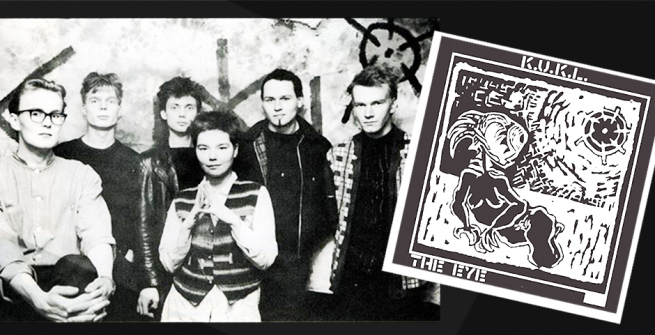Before the genre-defying, cutting-edge, affect-inspiring, singer-songwriter-composer-producer-actor extraordinaire mononymously known as Björk became a household name across the globe, she was the singer in an Icelandic alternative rock group with moderate success called The Sugarcubes. You may recall The Sugarcubes from their hit single “Birthday,” which still sounds as fresh, bubbly, and intoxicating today as it did when first impressing critics and listeners some 30-odd years ago. But prior to the poppy art rock of The Sugarcubes, Björk Guðmundsdóttir was creating something much harsher and more volatile in the avant-garde anarcho post-punk group Kukl.
Through support from the anarchist punk collective/band, Crass, Kukl was able to release records, via Crass Records, and comfortably align with radical left-wing politics. The music of Kukl bore some commonalities with the abrasive and confrontational sounds of Crass and Crass-related bands but provided a much welcomed departure from the aural monotony of the Crass sound. Starting from said punk aesthetics, Kukl were able to diverge musically into the avant-garde, the natural, the industrial, and even the mystical. Starting with their first album, The Eye (a nod to Georges Bataille’s book The Story Of The Eye), Kukl presented a propulsive ordered chaos, driven by the sounds of industry and nature simultaneously—discordant electric guitars, in-your-face thumping bass, and always-tumbling close-mic’d drums, alongside hand percussion, flutes, recorders and other woodsy, more “natural” elements. In large part due to the constantly active bass and drums, Kukl is always in motion, barreling along like a Miyazaki-esque animated steam engine—a mess of moving metal parts, always in flux—running down rusty tracks through an otherwise peaceful and serene snowy, woodland expanse. Atop the churning steam engine of instruments hover the vocals of Björk and Einar Örn, which range from impassioned and pained yelps and interjections, to cacophonous intertwining spoken/yelled word, to occasionally clearly sung melody. At times Björk’s vocals are as far out and discordant as that of Örn’s, but in some moments of perfect balance, she provides the beauty to counter the ugly, the tonal against the atonal, and even the natural to the industrial, reflecting the going ons of the underlying music. The name Kukl means “sorcery” in Icelandic, and fits the sound well—the aforementioned musical elements all combining to make something dark, witchy, and, to be honest, scary at times. The song “Open The Window And Let The Spirit Fly Free” (which may come up in Freegal as “Blackeye”) sonically brings to mind the image of coming across a seance in the woods, which gradually unfolds into some kind of nightmarish rabbit hole trip. Kukl was truly a unique addition to the Crass family, and The Eye is a lasting document of their specific artistic contribution to the musical vocabulary and reach of the anarcho punk movement of the 80s.
Many members of Kukl actually went on to form The Sugarcubes together, so there is something sonically familiar from one band to the next, aside from Björk’s iconic voice. In fact, to start with Kukl and make one’s way to The Sugarcubes and beyond to Björk as a solo artist, the musical progression and story become quite clear and linear. One can catch glimpses of the Disney Hall-packing, swan-wearing Björk in The Sugarcubes, and then hear tastes of The Sugarcubes in Kukl. Though on the surface Björk may appear to operate in some higher echelon of artistic class and wealth these days, she has remained intentionally tethered to her scrappier, more overtly political past, continuing to work with the same independent record label —One Little Independent Records (formerly One Little Indian), founded by fellow Crass Records alumni Flux Of Pink Indians—from her days in The Sugarcubes through to the present.
Kukl is harsh and not for the faint-hearted—they may even put off some die-hard Björk fans—but for those who dare, the music can offer an illuminating glimpse into Björk’s story, an interesting avant-garde take on the world of Crass and anarcho punk at large, and an all-around awesome listening experience.
The Eye and Kukl’s follow up album Holidays In Europe (The Naughty Nought) are available for free to stream or download on Freegal.


